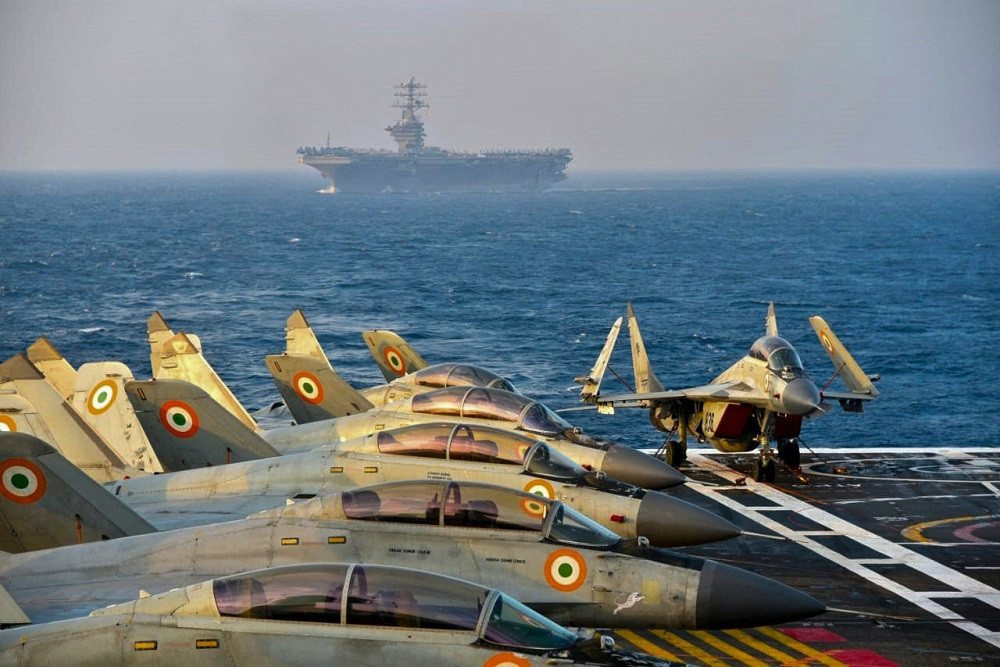Popular Reads
Top Results
Can't find what you're looking for?
View all search resultsPopular Reads
Top Results
Can't find what you're looking for?
View all search resultsUnderstanding tug of war between India and China in IOR
While India believes in capability building, China has so far focused on capacity building with profits siphoned back into its economy.
Change text size
Gift Premium Articles
to Anyone
I
ndia and China are both emerging powers of Asia and the world. The two nations are in territorial disputes but have managed to cooperate in numerous areas of mutual interest, such as the Asian Infrastructure Investment Bank (AIIB) and the Shanghai Cooperation Organization (SCO).
Their spheres of influence should be logically different due to their geographical locations. With both Asian giants trying to exert supremacy in the Indian Ocean due to their need to protect their sea lines of communication, multiple overlapping interests have emerged over the years. These overlapping interests have resulted in a tug of war between them, affecting the delicate security balance in the region.
While India believes in capability building, China has so far focused on capacity building with profits siphoned back into its economy.
As India sits in the Indian Ocean, it has so far enjoyed a continual patronage in this region. However, with the Indian Ocean Rim (IOR) becoming a major trade route that supports transportation of energy and resources (both living and non-living) for China’s growth and development, the country has shown increasing interest in the IOR. These interests include activities to realize infrastructure development.
These events and China’s involvement in the IOR, when seen in isolation, may not seem alarming in nature. However, when seen holistically, they paint a picture of China encircling India with a “String of Pearls” strategy.
On one hand, while India has a strategic hold on the Malacca Strait and can choke supplies to China, China has created commercial alternates in the form of Gwadar in Pakistan and Kyankpyn in Myanmar, which can be used as military facilities when needed. Similarly, using financial diplomacy, China has developed other commercial ports at Chittagong in Bangladesh and Humbantota in Sri Lanka.
In return, India has encouraged and financially supported the development of the Kaladan multi-modal transit transportation project in Myanmar, various power and rail projects in Bangladesh, the development of the eastern terminal of Colombo Port in Sri Lanka and the development of Chabahar Port in Iran. In addition, India is using diplomacy with countries like Bangladesh, Sri Lanka, Maldives, Mauritius and ASEAN nations to counter the growing dominance of China in the IOR.
On the trade front, while India is encouraging the Bay of Bengal Initiative for Multi-Sectoral Technical and Economic Cooperation (BIMSTEC) and the “Look East” policy to build a better trade connectivity with ASEAN, China is using the Regional Comprehensive Economic Partnership (RCEP) and other bilateral constructs to create a favorable market for itself.
Since the tug-of-war is a result of fear and mistrust between the two nations, the littorals of the IOR have used both China and India to advance their interests by developing military diplomacy and purchasing military hardware from the two nations.
Though a tug of war usually produces a winner, at present there is no winner in the China-India rivalry. In the interim, it is ASEAN nations like Indonesia that can play a unique role to diffuse the tension between these two giants and promote greater cooperation in the IOR.
Indonesia’s unique role stems from its strategic geographical position. Indonesia, which is geographically flanked by the Indian Ocean and the Pacific Ocean on either side witnesses the largest sea-based trade in the world of various commodities moving between these two water bodies in either direction.
Since the territorial waters of Indonesia connect the two oceans, every ship that moves on these waters necessarily passes through the straits situated in the waters of Indonesia. This unique position of Indonesia provides it the opportunity to act as a buffer and mediator to reduce potential conflicts in the region and encourage mutually beneficial cooperation.
To play the role peace broker in the ongoing tug of war between China and India, Indonesia needs to address three important aspects. First is to include the IOR as an important part of its outlook and foreign policy. In doing so, building cooperation and connectivity with India is recommended. Since Indonesia and India have historical and cultural bonds, geographical proximity and strong economy, developing such a connection would not be difficult. This effort can be accomplished by developing a comprehensive strategic partnership in the maritime sector, by connecting Aceh and the Andaman and Nicobar (A&N) Islands for trade and cultural exchange, as agreed upon by Indian Prime Minister Narendra Modi and President Joko “Jokowi” Widodo in Jakarta in May 2018.
Second is to encourage ASEAN to implement the ASEAN Outlook on the Indo-Pacific as a mutually agreed document to ensure ASEAN does not lose its relevance while not being swayed by either the United States-led Free and Open Indo-Pacific (FOIP) or China’s Belt and Road Initiative (BRI). Such an effort will also ensure the region remains a zone of peace, neutrality, freedom and mutual trust.
Third is to modernize and strengthen our military defense in a sustainable manner so as to protect ourselves from external threats and aggression. The defense capability building can focus on the maritime defense and monitoring systems. Indonesia needs to upgrade its naval base in Sabang into an independent main naval base.
As Indonesia performs its balancing act between the two Asian giants, India has to learn to accept the presence of China in the IOR. China, on the other hand, needs to respect the sovereignty and concerns of India and other nations in the region, and avoid actions that can create mistrust.
***
The writer is a lecturer at Almuslim University and a member of the Indonesian Task Force for Aceh-Andaman and Nicobar Islands Cooperation.










